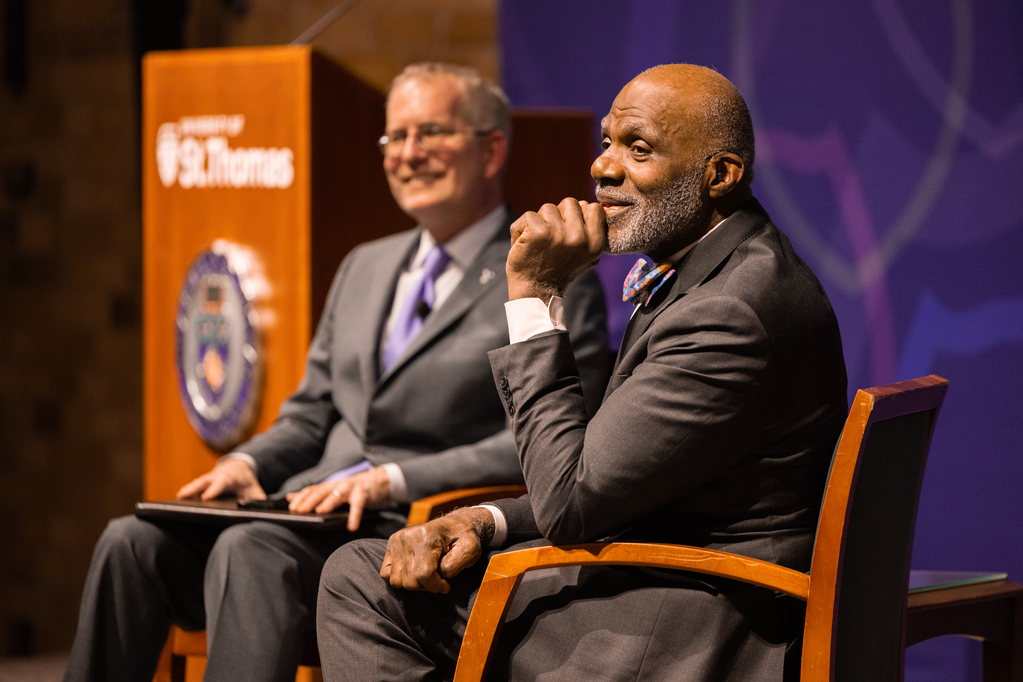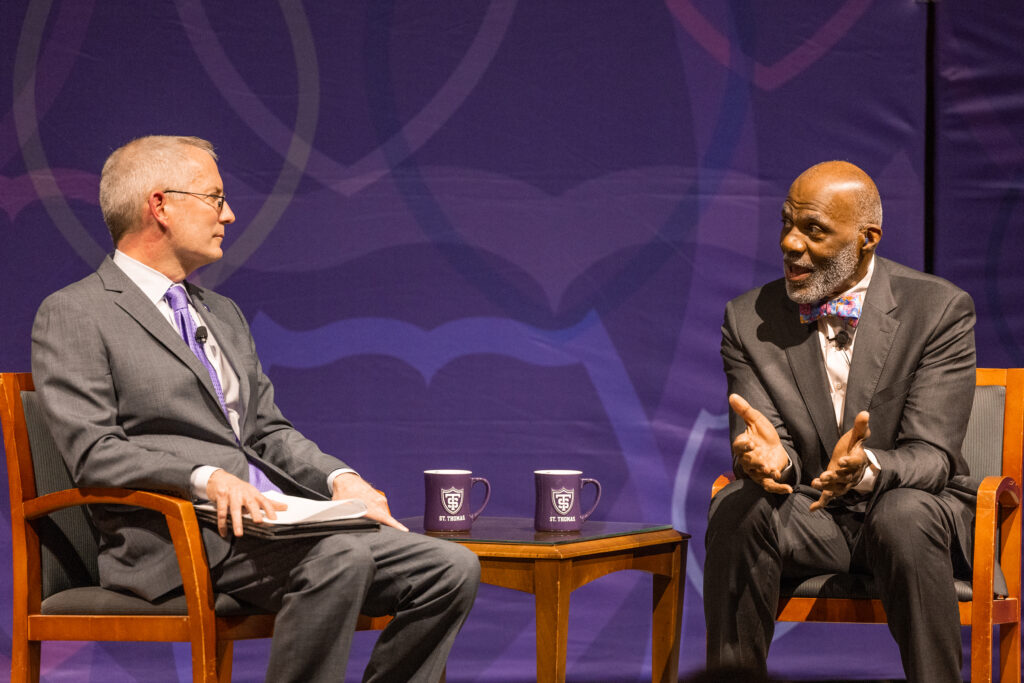College-bound students considering the University of St. Thomas will soon have the option to choose whether to submit their ACT or SAT scores as part of the application process.
Speaking at the annual State of the University address on Thursday, President Julie Sullivan announced St. Thomas would join a growing list of schools across the country that have adopted “test-optional” policies. Starting with the incoming class of 2021, students who apply to St. Thomas and choose the test-optional path will not have their test scores considered in the admission and scholarship review process. The decision supports an effort to more accurately identify students who have strong potential to successfully earn a college degree.
St. Thomas’ admissions team will continue to comprehensively review all submitted application materials including high school transcripts, strength of course selections, as well as out-of-class and service activities. Students who still wish to submit test scores are welcome to do so, and the admissions team will take them into account to help determine their best paths for success.
“Our priority is to find students who we believe can thrive at St. Thomas, and research strongly indicates standardized tests are not the best predictors of college success,” said Al Cotrone, St. Thomas’ vice president for enrollment. “There is also sufficient evidence that inherent biases in these tests are barriers that discourage many talented students from applying to schools where they could have thrived. Removing those barriers is in line with our mission to advance the common good by increasing access to a college education.”
The National Center for Fair and Open Testing indicates that well over 1,000 schools (approximately 25% of all U.S. colleges and universities) have already adopted test-optional policies, including many of the nation’s highly selective universities. The St. Thomas Admissions Office carefully researched how those institutions implemented their test-optional process to inform the university’s policy.
All applicants, regardless of whether they submit test scores, will be considered for merit-based scholarships. For students who elect the test-optional route, academic achievements such as performance in challenging classes and out-of-class involvement will be evaluated.
“Adopting a test-optional policy is the right thing to do because higher education is an incredibly valuable proposition, and a St. Thomas education positions our graduates for a lifetime of success,” Sullivan said. “We are acknowledging overwhelming evidence showing standardized test scores do not tell the full story of a student’s potential. As such, we believe they should not stand between a student’s ability to attain that future.”
Numerous websites, including FairTest and The Chronicle of Higher Education, have fact sheets and articles about test-optional policies.
Read more details about St. Thomas’ approach to its test-optional process in the FAQ below.
What does test optional mean?
It means that students will no longer be required to submit standardized test scores (ACT or SAT) as part of their application to St. Thomas. Instead, students will choose whether or not to include them. Those who do not include them will apply “test optional” and their scores will not be considered in our admission and scholarship review processes.
Why is St. Thomas going test optional?
Standardized tests aren’t bad. They just don’t tell the full story.
Tests like ACT and SAT aren’t always representative of a student’s ability. In fact, scores are often more correlated to a student’s household income than their academic success in college. There is also sufficient evidence that the inherent bias in standardized testing acts as a barrier that discourages many talented students from applying to schools where they could have thrived.
The decision to adopt a test-optional policy removes this barrier and provides students a choice of how to best showcase their abilities, talents and potential contributions to our community. We want to make St. Thomas accessible to high-achieving students entering college, regardless of how they performed on a standardized test.
When does this take effect, and who is impacted?
The incoming class of 2021 will be the first class at St. Thomas to have the option to apply for admission without submitting an ACT or SAT score.
What will be St. Thomas’ new approach to evaluating whether students can be successful here?
A comprehensive review of all submitted application materials is key to determining a student’s ability to thrive as a Tommie. Admissions will closely evaluate high school transcripts, course selection, out-of-class and service activities and any other information students wish to provide. The team will pay special attention to the strength of high school classes and a student's performance in them. They may choose to include their ACT and/or SAT scores as part of the overall admission application, but will not be penalized if they decide not to submit their scores.
Is St. Thomas lowering its academic/admissions standards?
No. St. Thomas has a rich tradition of academic excellence and is committed to admitting students who can be successful. Research shows standardized test scores are less accurate indicators of student success while they are in college. Studies have shown no appreciable difference in persistence between test-optional students and students who do submit their ACT or SAT scores. All students will continue to be held to the same, high academic standards that people have come to expect from St. Thomas.
Is this related in any way to St. Thomas’ attempt to move up to Division I athletics?
No. The decision to go test optional is based on St. Thomas’ goal to increase access to higher education, and doing so in a way that allows it to find students who will be successful here. This is in line with the university’s mission to advance the common good. Also, national rules specify that all student-athletes must submit test scores to the NCAA (although they will have the option of whether to submit the score to St. Thomas).
Will a test-optional student be disadvantaged in the admission process (i.e., will it lower their chances of being admitted)?
No. The university will thoroughly evaluate each application to determine whether someone will be a good fit at St. Thomas. As mentioned, ACT and SAT scores are less accurate indicators of a student’s ability to succeed in college. St. Thomas does not believe those scores are necessary to make good decisions for admitting students.
Without a standardized test, how will St. Thomas determine a student’s course placement?
Once admitted, test-optional students may need to take tests to determine course placements. St. Thomas’ math department, for example, already requires any students who have not submitted an ACT math sub score in the past two years to take an external assessment.
Do we expect that moving to test optional will negatively impact our U.S. News & World Report rankings?
Based on the experiences of other schools that have adopted test-optional policies, we do not anticipate this to impact our U.S. News & World Report rankings.







